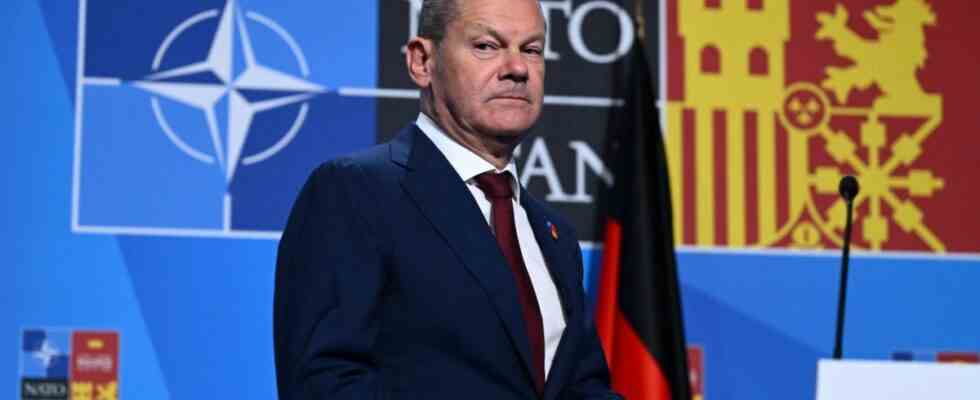It is, as Olaf Scholz describes it, the end of a “veritable mountain tour”. In eight days, the Chancellor completed four summit meetings, from the Western Balkans meeting and a European Council in Brussels to the G-7 summit in Elmau and what Scholz once again describes as a “high point”. At the NATO summit in Madrid, the accession of Finland and Sweden was initiated, which Scholz praises as a “historic decision”, and the alliance has come up with a new strategic concept, primarily to arm itself against the threat from Russia.
“NATO’s importance for our security, for the security of Europe, is greater than it has been for a long time,” says Scholz. For the Chancellor, a summit week is coming to an end in which, from his perspective, two things have happened: the EU, G7 and NATO have adjusted to the completely changed world situation. And he himself, as Scholz sees it, receives the recognition he deserves for setting the course after the attack on Ukraine.
“Risk life and limb to rush to each other’s aid. That’s NATO,” says Scholz
Scholz had already enjoyed extensive praise from US President Joe Biden in Elmau. At the NATO summit, too, the special fund of 100 billion euros that has since been approved by the Bundestag was recognized “in numerous contributions,” he reports. In a number of NATO countries, the German announcement gave the “decisive” impetus for their own efforts. It is the one message that Scholz would like to get across at home. The other is about the completely changed world situation. “In this world you need good and close friends,” Scholz repeats a sentence from Elmau. They can be found in particular in NATO with “30, soon 32 states that stand together according to the motto: One for all, all for one”. They would “risk life and limb to rush to each other’s aid. That’s NATO.”
Scholz finds it “ridiculous” that Russia’s President Vladimir Putin calls it “imperialist.” The defense alliance is “a threat to no one” and Putin himself is an imperialist, he says, listing what Germany is now doing to strengthen a NATO that is arming itself against another possible attack by Russia. “Credible and substantial” and also “as soon as possible”, Germany will support the rapid intervention reserve, which NATO Secretary General Jens Stoltenberg has put at 300,000 soldiers. With the announcement that it would have a combat brigade ready to defend Lithuania, Germany had “set the standard” in the alliance. With a regional naval command for the Baltic region, Berlin is also taking on leadership responsibility and, as a logistical hub, is playing an important role in the defense of the eastern alliance area.
The usual rules for NATO summits also apply to the Chancellor. First, Stoltenberg is allowed to announce the results and answer questions, after which there is a gap for all heads of state and government who are not from the USA. Almost everything in NATO is based on the US President’s schedule – and that’s the same with Joe Biden.
He also takes stock of the Elmau and Madrid summits, which he also calls “historic”. Biden has been touring Europe for almost a week and “at every stage of this journey we have documented how united and determined we are”. This message is aimed primarily at Vladimir Putin, who has failed to divide the West. Once again, Biden calls the mutual obligation to provide assistance laid down in Article 5 of the NATO treaty “sacred” and also repeats the promise that Scholz also likes to use: “We will defend every centimeter of NATO territory.” Barack Obama urged Europeans to invest more in their armies, so Biden naturally praises the announcements that the two percent target will be met. The first thing he mentions is the German 100 billion special fund, but immediately afterwards he praises the Balts and Romanians, who soon want to spend three percent of their economic output on defense.
Unlike Scholz and most others, Biden speaks at length about the “systemic challenge” that China also poses for NATO. This was also anchored in the new strategy concept. Biden promises to support Ukraine “as long as necessary” and announces another 800 million arms package for next week. This includes: a new modern western air defense system and additional ammunition for the system’s multiple rocket launchers Himarswhich Kyiv have already received.
A reporter reminds Biden of what he announced in 2021: “America is back”. With high energy prices, abortion rights overturned by the Supreme Court, and polls showing 85 percent of the US population think their country is on the wrong track, that right is in jeopardy. Biden, who calls the Supreme Court’s verdict “outrageous”, vehemently contradicts this: At all summits, the partners thanked the US for their leadership role. Biden then assures that his support for the modernization of the Turkish F-16warplanes was “no consideration” for Turkish President Recep Tayyip Erdoğan giving up his blockade on Finland and Sweden joining NATO. He hopes that Congress will approve this arms deal.
When Biden left the stage, another head of state came along. It is Erdoğan who wants to have the very last word in Madrid. He praised the agreement with Finland and Sweden, which he described as a “victory”. He eloquently reminds both of them that joining the alliance could take a long time: “It’s not a process that’s easy to complete.”

